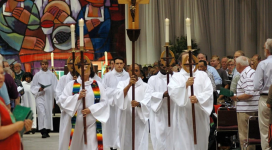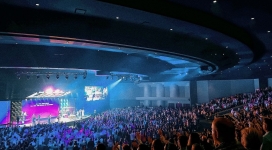Street protests, violence, and intensifying political instability in Lebanon has forced the Mideast Christian satellite network SAT-7 to cancel events and filming.
A special celebration for the network’s “Year of the Family” campaign scheduled for Friday was cancelled when the host of the event, The Bible Society of Lebanon, decided the country’s current situation was “too troubling” and “unpredictable” to invite guests and media to attend.
“Each day our staff comes to the studio not knowing if something might erupt and we won’t be able to return home,” said Naji Daoud, SAT-7’s Lebanon country director, in a statement released on Wednesday
Only months after the deadly war between Hezbollah and Israel left hundreds dead, a civil war now threatens to tear the fragile country apart. Hezbollah leader Sheik Hassan Nasrallah announced to thousands of supporters on Thursday that the group would ultimately bring down Lebanon’s Western-backed government, according to The Associated Press.
Nasrallah’s speech came on the seventh day of street protests in Beirut by Hezbollah which demanded Prime Minister Fuad Saniora to step down. Thousands of Hezbollah and pro-Syria supporters gathered in downtown Beirut vowed to not leave or stop the protests until their demands are met.
Earlier this week, a gunmen shot and killed a 20-year-old man in downtown Beirut and injured at least four other demonstrators, reported SAT-7.
“We want stability, but right now there is so much uncertainty,” said Daoud. “Everyone seems to be pessimistic about the future. We do not want another civil war.”
The SAT-7 Lebanon director noted that the station was forced to cancel a day of filming last week due to demonstrations and a guest from Syria declined to come because of the situation in Lebanon
SAT-7 staff members in Lebanon – a country with about 1.4 million Christians - ask Christians to pray for peace in Lebanon.
The Christian satellite TV network began broadcasting to the Middle East and North Africa in 1996. SAT-7 programs are aimed at supporting and strengthening the Christian community in the Arab world as well as providing non-Christians a better understanding of the beliefs of Christianity. Currently, between five and six million people watch the channel each week via satellite in the Middle East, North Africa, Europe, and in Central Asia.







